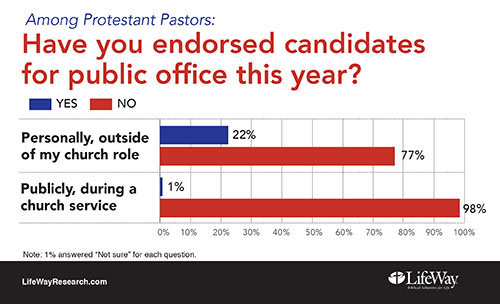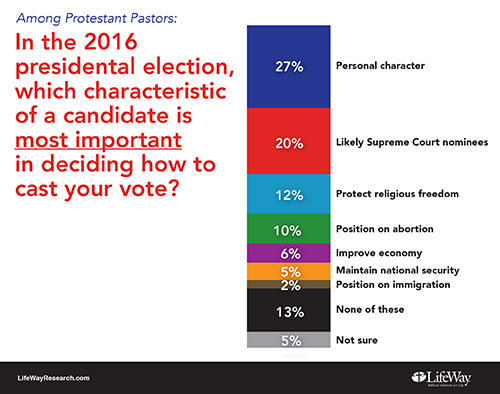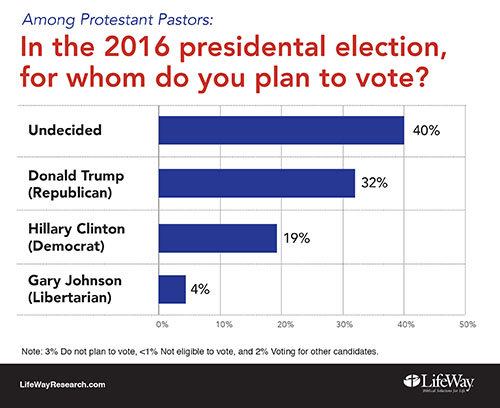The Christian Index
By Bob Smietana NASHVILLE (BP) — Political endorsements by preachers appear to have been few and far between this election season. That may be because the most popular candidate among preachers is "I don't know," a new study shows.

A new report from LifeWay Research found 4 out of 10 Protestant pastors are undecided about which candidate to vote for. A third (32 percent) plan to vote for Donald Trump. One in 5 (19 percent) plans to vote for Hillary Clinton. Four percent support Gary Johnson. Three percent do not plan to vote. Few pastors believe Christians who vote their conscience will all support the same candidate. And few say Christians should vote only for a candidate who has a reasonable chance of winning. Meanwhile, only one preacher in 100 has endorsed a candidate from the pulpit. Those are among the findings of a new survey of 1,000 Protestant senior pastors conducted Aug. 22-Sept. 16. Most are ambivalent about the major party candidates, said Scott McConnell, executive director of LifeWay Research. "Donald Trump does better with pastors than Hillary Clinton," he said. "But both candidates are still less popular than 'Undecided.'"
Voting is a must
Researchers found wide support for voting among Protestant pastors. Eighty-eight percent of pastors say American Christians have a biblical responsibility to vote. That includes pastors of all denominational stripes – from Pentecostal (98 percent) and Baptist pastors (95 percent) to Presbyterian/Reformed pastors (81 percent) and Church of Christ ministers (79 percent).

But pastors don't expect all Christians to vote the same way. And few believe Christians should support only candidates who can win. Two-thirds (65 percent) disagree with the statement, "Christians who truly vote their conscience will vote for the same candidate." Less than a third (29 percent) agree. Six percent are not sure. Two-thirds also disagree with the statement, "American Christians should vote for a candidate who has a reasonable chance of winning." Twenty-nine percent agree. Six percent are not sure. While they believe voting is important, Protestant pastors have been extremely reluctant to make political endorsements during church services. Ninety-eight percent of pastors surveyed have not endorsed a candidate during a church service this year. One percent have endorsed a candidate during a service, and one percent are not sure. Endorsements outside church are more common. Twenty-two percent of Protestant pastors have endorsed a candidate outside of their church role. Seventy-seven percent have not. One percent are not sure. A similar survey in 2012 found 10 percent of Protestant pastors agreed when asked whether pastors should endorse a candidate from the pulpit. Eighty-seven percent disagreed. In 2012, 44 percent agreed they had endorsed candidates outside of their church role. Fifty-two percent disagreed. "Enthusiasm for endorsements appears to be waning this year," McConnell said.
Motivations vary
Researchers found no consensus among pastors about which characteristic matters most when choosing a candidate. Twenty-seven percent say personal character matters most. Twenty percent are most concerned about a candidate's likely Supreme Court nominees. Twelve percent say the ability to protect religious freedom is most important. Ten percent point to the candidate's position on abortion. Among other factors: the ability to improve the economy (6 percent), ability to maintain national security (5 percent), and a candidate's position on immigration (2 percent). Pastors voting for Trump are more likely to cite Supreme Court nominees (36 percent) and abortion (17 percent) and less likely to say personal character matters most (10 percent). Pastors voting for Clinton are more likely to cite personal character (28 percent) and immigration (7 percent) and less likely to cite abortion (less than 1 percent). Baptist pastors care most about potential Supreme Court nominees (28 percent). Presbyterian/Reformed (36 percent), Methodist (34 percent), and Holiness pastors (34 percent) favor personal character, and Pentecostal pastors (30 percent) care most about religious freedom.
Demographics, denominations matter

LifeWay Research found demographics and denominations divide pastors when it comes to the 2016 election:
- African-American pastors (37 percent) are most likely to vote for Clinton. Six percent plan to vote for Trump and 54 percent are undecided.
- White pastors (35 percent) favor Trump, while 18 percent favor Clinton and 41 percent are undecided.
- Methodist (44 percent) and Presbyterian/Reformed pastors (50 percent) are more likely to support Clinton.
- Baptist (46 percent) and Pentecostal pastors (61 percent), along with Church of Christ ministers (50 percent), are more likely to favor Trump.
- Pastors voting for Trump are the most likely to say Christians should vote for a candidate who can win (43 percent).
- Evangelical pastors (36 percent) are more likely than mainline pastors (16 percent) to say Christians who vote their conscience will support the same candidate.
- Democratic pastors (78 percent) are most likely to vote for Clinton.
- Republican pastors (53 percent) are most likely to vote for Trump.
- Pastors who are still undecided include independents (52 percent), those age 18-44 (52 percent), and evangelicals (45 percent).
Clergy and other church leaders may share a common faith, McConnell said. That doesn't mean they all agree on who should lead the country. "When it comes to politics, pastors are just as divided as other Americans," McConnell said. For more on the study, read the report PDFs:
Pastor Views on the 2016 Presidential Election and
Pastor Endorsements of Political Candidates.
 A new report from LifeWay Research found 4 out of 10 Protestant pastors are undecided about which candidate to vote for. A third (32 percent) plan to vote for Donald Trump. One in 5 (19 percent) plans to vote for Hillary Clinton. Four percent support Gary Johnson. Three percent do not plan to vote. Few pastors believe Christians who vote their conscience will all support the same candidate. And few say Christians should vote only for a candidate who has a reasonable chance of winning. Meanwhile, only one preacher in 100 has endorsed a candidate from the pulpit. Those are among the findings of a new survey of 1,000 Protestant senior pastors conducted Aug. 22-Sept. 16. Most are ambivalent about the major party candidates, said Scott McConnell, executive director of LifeWay Research. "Donald Trump does better with pastors than Hillary Clinton," he said. "But both candidates are still less popular than 'Undecided.'"
A new report from LifeWay Research found 4 out of 10 Protestant pastors are undecided about which candidate to vote for. A third (32 percent) plan to vote for Donald Trump. One in 5 (19 percent) plans to vote for Hillary Clinton. Four percent support Gary Johnson. Three percent do not plan to vote. Few pastors believe Christians who vote their conscience will all support the same candidate. And few say Christians should vote only for a candidate who has a reasonable chance of winning. Meanwhile, only one preacher in 100 has endorsed a candidate from the pulpit. Those are among the findings of a new survey of 1,000 Protestant senior pastors conducted Aug. 22-Sept. 16. Most are ambivalent about the major party candidates, said Scott McConnell, executive director of LifeWay Research. "Donald Trump does better with pastors than Hillary Clinton," he said. "But both candidates are still less popular than 'Undecided.'"  But pastors don't expect all Christians to vote the same way. And few believe Christians should support only candidates who can win. Two-thirds (65 percent) disagree with the statement, "Christians who truly vote their conscience will vote for the same candidate." Less than a third (29 percent) agree. Six percent are not sure. Two-thirds also disagree with the statement, "American Christians should vote for a candidate who has a reasonable chance of winning." Twenty-nine percent agree. Six percent are not sure. While they believe voting is important, Protestant pastors have been extremely reluctant to make political endorsements during church services. Ninety-eight percent of pastors surveyed have not endorsed a candidate during a church service this year. One percent have endorsed a candidate during a service, and one percent are not sure. Endorsements outside church are more common. Twenty-two percent of Protestant pastors have endorsed a candidate outside of their church role. Seventy-seven percent have not. One percent are not sure. A similar survey in 2012 found 10 percent of Protestant pastors agreed when asked whether pastors should endorse a candidate from the pulpit. Eighty-seven percent disagreed. In 2012, 44 percent agreed they had endorsed candidates outside of their church role. Fifty-two percent disagreed. "Enthusiasm for endorsements appears to be waning this year," McConnell said.
But pastors don't expect all Christians to vote the same way. And few believe Christians should support only candidates who can win. Two-thirds (65 percent) disagree with the statement, "Christians who truly vote their conscience will vote for the same candidate." Less than a third (29 percent) agree. Six percent are not sure. Two-thirds also disagree with the statement, "American Christians should vote for a candidate who has a reasonable chance of winning." Twenty-nine percent agree. Six percent are not sure. While they believe voting is important, Protestant pastors have been extremely reluctant to make political endorsements during church services. Ninety-eight percent of pastors surveyed have not endorsed a candidate during a church service this year. One percent have endorsed a candidate during a service, and one percent are not sure. Endorsements outside church are more common. Twenty-two percent of Protestant pastors have endorsed a candidate outside of their church role. Seventy-seven percent have not. One percent are not sure. A similar survey in 2012 found 10 percent of Protestant pastors agreed when asked whether pastors should endorse a candidate from the pulpit. Eighty-seven percent disagreed. In 2012, 44 percent agreed they had endorsed candidates outside of their church role. Fifty-two percent disagreed. "Enthusiasm for endorsements appears to be waning this year," McConnell said.  LifeWay Research found demographics and denominations divide pastors when it comes to the 2016 election:
LifeWay Research found demographics and denominations divide pastors when it comes to the 2016 election: